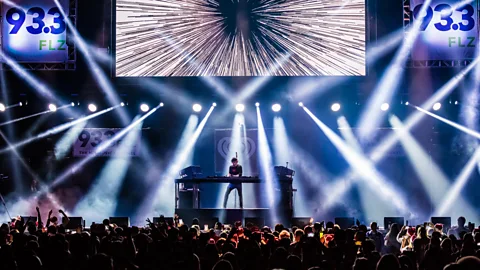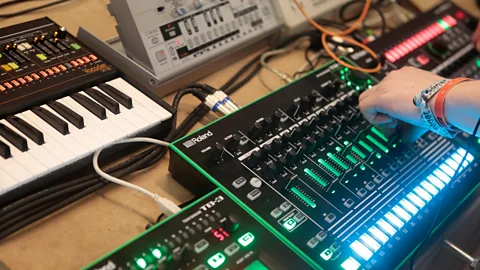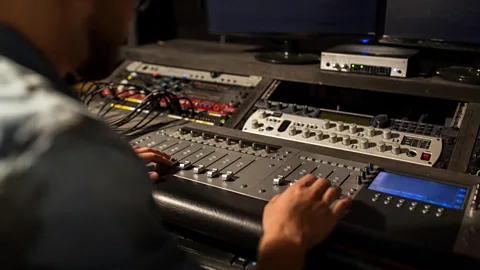The hidden beat makers behind music’s big hits
 Alamy
AlamyMusic producers who make beats used to struggle to make a living. Now online stores and non-exclusive licenses are allowing them to flourish.
Wasim Khamlichi was always a computer geek. When he got his first computer at the age of 10, he could barely wait to get it home and tear it apart. “I started breaking things and coding,” he says. At 16, he became a software developer for a company that developed programs for HMRC, the UK tax collection agency.
But Khamlichi wasn’t sure he wanted to build a career in software development. After a year of programming, he left the company and became a music producer. He went to the UK School of Audio Engineering, a private college with outposts in 20 different countries, and on graduation travelled to Boston in the US to intern at a recording studio.
When he returned from Boston in 2008, he faced a quandary. He wanted to become a music producer, but the likelihood of success was low. “It’s either you get signed to a label, or you find a big artist that you can work with and come up together,” says Khamlichi, who is now 33.
Instead, he created a new path; he combined his passions to code an online store that could be embedded into websites, where he could license his music to artists who wanted to find backing beats for their tracks.
It was a success, and soon music producers were asking him to add the online store to their own websites. He did so, then decided to convert the individual projects into a standalone mass-market service. Today the service, called Airbit, has nearly half a million users.
 Alamy
AlamyFrom hobby to full-time job
Among them is Dutch music producer Robin Wesley, who got into making beats in 2013, joining a website called Soundclick when there only around 100 music producers creating beats on the platform. Soundclick and other beat-selling sites represented a new opportunity: they opened up a marketplace to hobbyists to potentially sell their wares to professionals. Prior to this, musicians would rely on a small cadre of professional beat makers to provide the soundtrack to their songs. Producers would sell non-exclusive licences to other music producers, artists and songwriters to use the backing tracks in songs, commercials and movie soundtracks.
Wesley soon moved over to Airbit, working as a logistics manager during the day and making beats to sell at night.
He focused on copying what was popular in the music charts at the time – back then, he produced beats that would lend themselves to being used in hip hop and rap tracks. “But after a while I just wanted to do what I loved most,” he says. “I always tell people to do what you love most: if you have to force yourself to be creative in areas you don’t really want to be creative in, it’s not sustainable.” His first love was 90s-style rhythm and blues.
It took a few years, but Wesley now makes a full-time salary from selling beats online. He’s not alone: what began as a cottage industry has exploded, with an entire cadre of music producers now making a healthy living from their beats. Wesley has sold more than 10,000 licences for the more than 160 beats he’s produced since 2013.
In 2015 he made $30,000 (£23,250) from the beat-selling market. This year, he’ll reach something nearer $100,000. “That’s from the beats alone, just for my beats and services related to some beats,” he says.
 Alamy
Alamy‘Win-win for buyers and sellers’
Selling beats online has been an enormously liberating experience, says Wesley. It has also helped diversify the music industry. Barbara Rodriguez, a 28-year-old beat producer who sells her music under the name Babi, studied nursing in her home nation of Venezuela, thinking her dreams of a career in the music industry were unrealistic. “There are not as many opportunities in Venezuela as in other countries,” she explains.
When she moved to Miami at the age of 25, she decided to try and break into the music industry. As a woman, she found it difficult. “You can feel how other artists underestimate you at first,” she says. “I have to work harder on the first impression.” She found beat selling could be more equitable and, a year ago, she launched her own online shop for her beats.
Many others opt to use the brokerage sites, which have done well from the rise in beat selling. One of the biggest platforms in an industry that includes other sites such as BeatStars, SoundClick and Soundee, Airbit has more than 400,000 users and has sold licences to more than a million beats. Sellers on the site have made more than $33m in total since it launched in 2009, says Khamlichi.
A key factor has been an important shift in the music industry. In decades past, if you were a musician and wanted to buy a beat, you would likely buy the exclusive rights to that piece of music – no-one else could use it except you, and the person who made it couldn’t sell it or license it to anyone else.
But in the past few years a new trend has emerged: non-exclusive licensing, which lets multiple people use the music, and has changed the game for producers and artists alike.
“Being able to sell the same beat again and again to multiple artists and make a recurring income from a single beat was kind of unheard of before,” says Khamlichi.
It works or both sides. People making the beats are able to get multiple returns on investment for their labour, with plenty of people reusing the same backing track over and over. A single beat can guarantee years of income if it proved popular.
 Alamy
AlamyAt the same time, the freedom to make money multiple times for a single beat means that the producers could reduce the cost to licence the beat – usually to between $25 and $200. “It makes it cheaper for people who want to use music in their content,” explains Craig Hamilton, a research fellow in Birmingham City University’s school of media focusing on popular music and the role of digital technologies.
That means that the types of people who can create new music using these beats is broader than ever before. Independent artists can afford to license beats, for example. “If the song blows up, or the artist gets signed and makes a lot of money from that track, the publishing revenue is split between the producer and the artist,” says Khamlichi. “It’s a win-win situation from both ends.”
‘Ride that horse ‘til they can’t no more’
And some songs really have blown up – including the world’s biggest hit of 2019. “The big story around this is that Lil Nas X paid $30 for a beat on ‘Old Town Road’,” says Hamilton.
The American rapper, singer and songwriter, who has broken records for sitting at the top of the charts, created his hit song with the help of a beat seller similar to Wesley. “[The beat seller] got a big break,” says Wesley. “That opened up the eyes of other people around the world too. It’s getting a lot more attention now.”
Wesley’s biggest hit is a track called ‘Backseat Lover’, a R&B instrumental involving plinking guitar sounds, drums and more, all layered using synthesised keyboards. First developed in 2014, licences to it sold every day for months.
“That one beat really helped my business take off,” he says. People who first came to him for ‘Backseat Lover’ ended up turning into return customers. “Some of my customers will spend a couple of hundred dollars every year, just on my music,” he says.
Some producers have even become minor celebrities themselves. “We’ve come to a stage where the producer is becoming as equally appreciated for a track as well as the artist,” says Khamlichi. “Before you heard a track and thought only about the artist, not the producer behind it. Now it’s becoming almost 50/50.”
But whether this success will continue is unclear. The rise of tech-enabled beat-making has made some people very successful – but the march of technology may be those people’s downfall.
“I think AI is the joker in the pack,” says Hamilton. “I’m pretty sure that you won’t need to buy a beat shortly. The way companies are framing it, it’s initially something to augment the production process for professionals, but in the potential long-term applications, if they’re correct about the technology, you’ll be able to say [to an AI]: ‘I’m having a barbecue, create a tune that is complementary to that kind of content.’”
It may well be for that reason that Wesley has diversified his income, starting three more businesses on the side. They’re all related to music and beat production, including Soundee, his own beat-selling platform.
But until the point technology moves on, to borrow a phrase from Lil Nas X – who benefited so much from the industry – these producers are likely to ride that horse ‘til they can’t no more.
